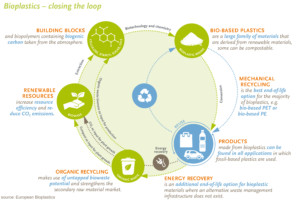At the end of January 2017, the European Commission published their Roadmap for a Strategy on Plastics. François de Bie, Chairman of European Bioplastics, welcomed the Roadmap and said in a statement: “An EU Plastics Strategy is needed to drive continued change in the plastics industry towards an innovative, sustainable, and resource-efficient economy”.

“The European Commission’s ambitious circular economy approach becomes apparent in the Roadmap. Alternatives to fossil feedstock such as biomass or CO2 will be taken into account for the manufacture of plastics. Furthermore, diverse end-of-life options will be assessed. Making use of biodegradation properties of bioplastics will help to divert organic waste from landfill and will help reduce plastic leakage into the environment”, acknowledges de Bie.
The Commission has given priority to assessing how to decarbonise the plastic industry. Replacing a significant proportion of the conventional fossil feedstock with plant-based or waste-based alternatives would contribute greatly to the reduction of GHG emissions. Both market push and pull measures could drive this transition, as would a level-playing-field regarding access to bio-based feedstock in the EU. This approach needs to be underpinned by smart sustainability criteria in order to ensure responsible sourcing and food security. European Bioplastics will continue to share further information on standards, certifications, and labels available for bioplastics and the benefits they offer in a circular economy.
For more information, read the full EUBP statement on the EU Roadmap for a Strategy on Plastics here.